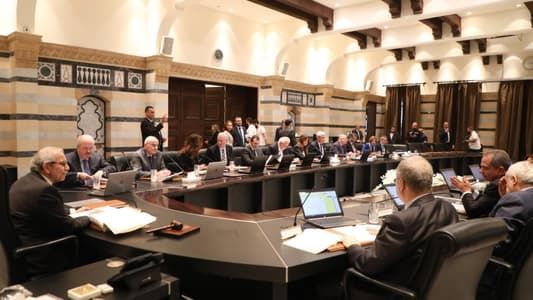
Bou Nassar and Chinozian Join Mansouri and Chahine as Vice Governors of the Central Bank.
At midnight between Monday and Tuesday, June 9, the terms of the four vice governors of the Central Bank of Lebanon (BDL) expired: Wassim Mansouri, Bachir Yaqzan, Salim Chahine, and Alexander Mouradian, along with the mandate of the president and members of the Banking Control Commission and three members appointed as experts to the Capital Markets Authority.
According to Article 18 of the Code of Money and Credit, “The Governor of the Central Bank of Lebanon is appointed for six years by decree of the Council of Ministers upon the proposal of the Minister of Finance. The Vice Governors are appointed for five years by decree of the Council of Ministers upon the proposal of the Minister of Finance and in consultation with the Governor.”
In line with this, the Council of Ministers renewed Wassim Mansouri as First Vice Governor and Salim Chahine as Third Vice Governor. The Druze-designated Second Vice Governor seat was assigned to Makram Bou Nassar, Executive Director at BDL, replacing Bachir Yaqzan. The Fourth Vice Governor, traditionally from the Armenian community, was appointed to Gaby Chinozian. With that, all four vice governor seats are now filled.
Banking Control Commission and Sector Reform
Also resulting from the Cabinet session was the appointment of Mazen Soueid as President of the Banking Control Commission, alongside Nader Haddad, Tania Kollab, Aline Spiro, and Rabih Nehmeh as members.
The Banking Control Commission plays a pivotal role in the process of reforming the banking sector, especially following progress made in the most recent session of the parliamentary Finance and Budget subcommittee. A joint reform proposal, developed by Central Bank Governor Karim Souhaid, was extensively discussed, leading to consensus on creating a single authority: The Supreme Banking Authority.
This authority, aligning with the Governor’s recommendations regarding independence, will consist of two chambers:
-
One to handle issues under normal operating conditions,
-
Another to manage comprehensive banking sector crises.
Under the agreement, the first chamber will include:
-
The Central Bank Governor (as President),
-
The First Vice Governor,
-
The Director General of Finance,
-
A judge appointed by decree based on a shortlist from the Higher Judicial Council,
-
The President of the Banking Control Commission,
-
And the President of the National Deposit Guarantee Institution.
The second chamber, also chaired by the Governor, is still under deliberation. It may include either two Vice Governors appointed by the BDL Central Council or an expert proposed by the Bar Association or the Association of Certified Public Accountants. This matter will be settled by the Finance Committee and the full parliament. A judge appointed by decree and a representative from the Deposit Guarantee Institution (not affiliated with commercial banks) will also sit in this chamber.
What Are the Powers and Duties of the Banking Control Commission?
The previous Banking Control Commission effectively abandoned its responsibilities and remained absent from the public scene since Lebanon's financial collapse in 2019.
With the appointment of Mazen Soueid as its new president, the Commission is regaining visibility. So, what are its powers and responsibilities?
According to Article 8 of the amended Law No. 4/84, which established a mixed institution to guarantee deposits, the Banking Control Commission was created under Law No. 28/67 at the Central Bank. Importantly, the commission is independent in carrying out its duties and does not report to the Central Bank.
Article 9 of the Code of Money and Credit outlines the Commission’s main tasks:
-
Monitoring the banking system and ensuring compliance with the Code of Money and Credit,
-
Conducting regular audits of banks,
-
Evaluating all types of risks (credit, sovereign, operational),
-
Accessing all data, including accounts and transfers,
-
Requesting documents and conducting on-site bank inspections,
-
Proposing recovery or restructuring plans for distressed banks,
-
Preparing periodic reports for the Central Bank Governor, commissioners, and BDL’s Board of Directors.
Who Is Mazen Soueid, the New Head of the Banking Control Commission?
Mazen Soueid brings extensive experience in economics, banking, and finance. He is an economist and advisor in these fields, with over 25 years of experience both in Lebanon and internationally. He currently serves as Chairman and General Manager of the Investment Development Authority of Lebanon (IDAL).
In the banking sector, he held several key roles at Deutsche Bank in London and New York, as well as at BankMed. He also served on the boards of various Lebanese banks.
He worked at the International Monetary Fund in Washington, D.C., advised the Prime Minister of Lebanon (2009–2010), and represented the banking sector in the Lebanese Economic and Social Council, where he chaired the productive sector committee.
A specialist in capital markets and financial policy, Soueid has advised governments in countries including Mexico, Venezuela, South Korea, the Philippines, Angola, Hong Kong, Singapore, Japan, Myanmar, Laos, Syria, Libya, and Algeria.
His areas of expertise include:
-
Monetary policy,
-
Debt management and sustainability,
-
Debt restructuring,
-
Capital market development,
-
Bank supervision and restructuring.
Soueid holds a PhD in Economics from Brown University (2000), a Master’s in Economics and Finance from Boston University (1996), and a Bachelor’s in Economics from the American University of Beirut (1995), graduating with honors.
He has taught courses at Brown and at AUB’s Business and Economics Faculty. He also served on the advisory board of Beirut Arab University’s Business School, where he supervised the doctoral thesis of Saudi Ambassador to Lebanon, Ali Awadh Asiri, in business administration.




Comments